Coming soon! Now available for borrowing!
[vodpod id=Video.1889403&w=425&h=350&fv=%26rel%3D0%26border%3D0%26]

December 22, 2010
by Mrs Sinclair
0 comments
Coming soon! Now available for borrowing!
[vodpod id=Video.1889403&w=425&h=350&fv=%26rel%3D0%26border%3D0%26]
December 14, 2010
by Mrs Sinclair
0 comments
Exploring the internet for specific information often leads one to being side tracked, yet, on many occasions a little gem of information or a link to an exciting online tool comes your way.
I very recently found one such website whilst browsing an excellent blog Heart of the School which recognises and promotes the role of the school library in learning and teaching. I was viewing the Christmas TV list which links films and television programmes on over Christmas to books. It was presented in such a way that it viewed like an online magazine, where one could actually turn virtual pages. Now this was rather impressive and got me thinking (baring in mind the work currently being carried out on a Reading Guide) that some library documents, and potentially newsletters, etc could be disemminated in this way as well as in the traditional paper-based ways.
Issuu is an online digital publishing platform which allows anybody to publish reports, magazines and many other types of document. Documents can be ‘broadcast’ to the world or kept private within the Issuu site itself. They can be embedded into web pages or set up as links so you can highlight them to those you want to see them.
As with many Web 2.0 tools (which include social networking sites, blogs, photo storage, etc and may well be the subject of a later post) you do have to be aware of internet safety issues, evaluating what you are using and reading and being careful about personal details.
So, here is the first attempt at publishing an online document in a visually interesting way. This is the ‘Library Guide’ which is available for staff and pupils in the library.
Enjoy! F.S.
December 3, 2010
by Mrs Sinclair
0 comments
It has been a long week of snow, with school closed to pupils at the start of the week. We now have made it back to as near normal as possible with all but a couple of busses not able to run due to ongoing bad road conditions in places. The snow by no means has gone and still means the landscape is looking crisp and clean and the sunrises spectacular.
Here are a few photos taken from the library and school this morning:
November 9, 2010
by Mrs Sinclair
0 comments
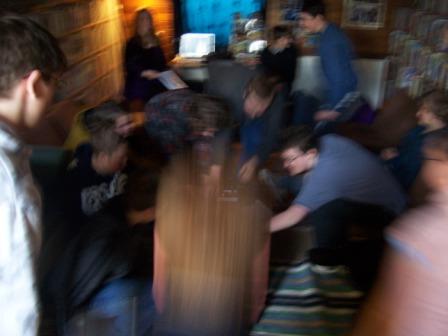
Appropriately blurry ghostly photo as pupils 'dive' into the snacks which they had patiently stared at for a long time before I remembered to tell them they could help themselves!
The annual story telling event on or around Hallowe’en that has become ‘Spooky Happenings’ was held in the school library at lunchtime of Friday 29th October 2010. This event, started in 2006, is now in its 5th year of running and has become an established part of the library calendar. 25 pupils and one member of staff attended over the course of both lunches and partook of the snacks available and the ‘darkened’ atmosphere in the Reading Zone which once again was decorated for the occasion.
As last year, the event was kept informal and only advertised in the week running up to it. There are enough resources collated, now, so that there doesn’t need to be too much research to source ghost stories, meaning that, in theory, pupils shouldn’t necessarily be hearing or reading out the same ones every year. Although, having said those that had been to these events previously requested my own personal stories again which I was honoured to retell. Pupils also shared their own stories. FS
November 9, 2010
by Mrs Sinclair
0 comments
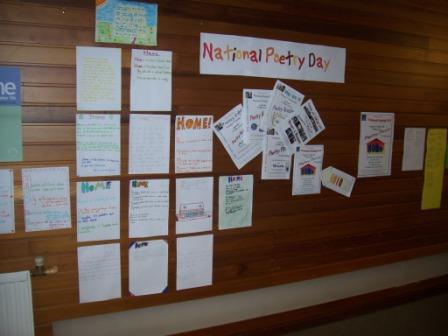 The annual Poetry Picnic to celebrate National Poetry Day was held in the library on Thursday 7th October at lunchtime. This year’s theme was ‘Home’. Preparation started around two – three weeks in advance with notices being put up and staff being invited to submit their thoughts about ‘home’
The annual Poetry Picnic to celebrate National Poetry Day was held in the library on Thursday 7th October at lunchtime. This year’s theme was ‘Home’. Preparation started around two – three weeks in advance with notices being put up and staff being invited to submit their thoughts about ‘home’
1M produced colourful poems as posters and 2z wrote down their thoughts on paper during classtime. The rest of S1 and S2 wrote down their thoughts on scrap paper during their library periods which were the collated and word processed for display.
The event was attended by 31 pupils, mostly library regulars. They enjoyed the snacks provided and fully took part in the poetry pairs game where they tried to match cards with a poem about an animal home and animals on them. Pupils were to turn a poem card over and read out the poem (or short extract), then try to find the matching animal picture card. This ran for the whole session with pupils dropping in and out at each lunchtime bell. Prizes (book) were given to pupils with the most pairs. All attendees received a certificate of attendance.
October 4, 2010
by Mrs Sinclair
Comments Off on National Poetry Day
The annual ‘Poetry Picnic’ will take place in the library on Thursday 7th October from 12:30pm to 1:35pm.
This year’s theme is ‘HOME’ so come along with your thoughts and ideas about what home means to you.
September 1, 2010
by Mrs Sinclair
0 comments
The library can be a very busy place at lunchtimes. Pupils read, go on computers or play computer games. The atmosphere is somewhat relaxed with around 25 – 30 pupils regularly visiting. Board games such as chess and draughts prove popular as do the computers. Despite the informal nature of the lunchtime sessions some pupils do manage to do school work and all the regular library users know that work will always get priority on the computers over leisure use.
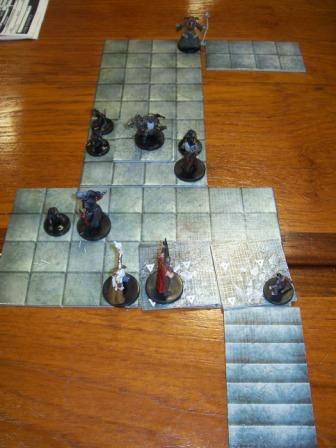 Friday activities started back in the first week of term and the librayr activity of ‘Dungeons and Dragons’ saw 15 pupils taking part. A number of whom were beginners to the game. The first session for the beginners was an overview of the game and the complicated character sheet and an introduction to basic combat using the miniatures and dungeon tiles to help explain movement and positioning of characters. Meanwhile the more experienced players got straight back into role-playing as though they had never been away.
Friday activities started back in the first week of term and the librayr activity of ‘Dungeons and Dragons’ saw 15 pupils taking part. A number of whom were beginners to the game. The first session for the beginners was an overview of the game and the complicated character sheet and an introduction to basic combat using the miniatures and dungeon tiles to help explain movement and positioning of characters. Meanwhile the more experienced players got straight back into role-playing as though they had never been away.
The after school opening of the library restarted on Tuesday 31st August and this saw the usual regulars coming a long to play ‘Dungeons and Dragons’. After some discussion the eight experienced pupils and one beginner split into two groups. A pupil DM’d (Dungeon Mastered) one group whilst Mrs Sinclair, the Librarian, led the other group through a goblin lair.
Pupils enjoy this activity and gain a lot of benefit from playing. Games are developed by pupils or myself in our own time at home and require a considerable amount of creative input. D&D certainly meets aspects of the ‘4 Capacities’ in Curriculum for Excelllence with pupils becoming:
Successful Learners – literacy (reading the manuals), communication (using role-playing) and numeracy (maths with up to 20-sided dice, additions, subtractions, negative numbers when calculating attacks and defenses and health points) skills; Think creatively and independently (making up stories on the spur of the moment)
Responsible Citizens – Learning to respect each other (taking turns, etc)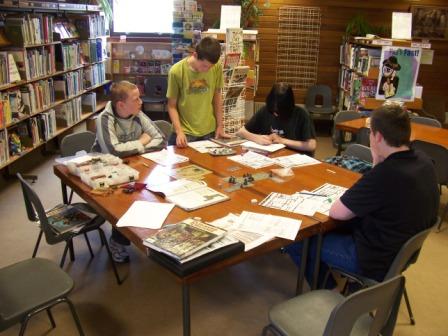
Confident Individuals – Relating to others; assessing risk and take informed decisions (albeit in a role-play / imaginary context, but these decisions can affect how the character in the game acts)
Effective Contributors – Communicating in different ways (they have to be able to communicate with each other); Work in partnership and teams; Taking the initiative; Critical thinking; Solving problems.
Lessons on how to use the school Library got underway in the first week of term with pupils discussing the library rules and being issued with their library cards. The following week they were introduced to the layout of the library and other general information (opening times, borrowing books, etc). This week they are being introduced to the fiction section of the library, being shown how to successfully browse the shelves and to use the library catalogue. In future weeks, they will learn about the arrangement of non-fiction books, the Dewey Classification and more advanced catalogue searching.
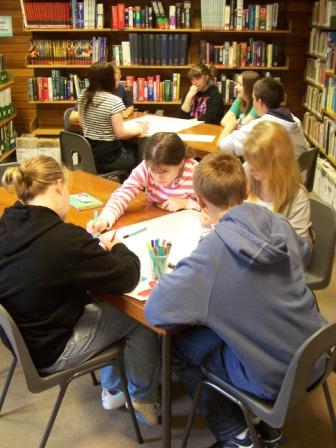 During the first couple of weeks of the new session S2 classes, during their library periods, are reminded about the library rules and what activities the library can be used for. They have group discussions, then each group creates a poster suggesting key rules and informing others what the library can offer.
During the first couple of weeks of the new session S2 classes, during their library periods, are reminded about the library rules and what activities the library can be used for. They have group discussions, then each group creates a poster suggesting key rules and informing others what the library can offer.
September 1, 2010
by Mrs Sinclair
0 comments
So, here we are, now in our third week back after the long summer break and it almost seems like we have never been away. The annual cycle has started again as pupils and staff knuckle down for another session’s work. It is a busy time of year for the library as S1 pupils do the library induction course over 6 weeks (one period a week). Library activities at lunchtime and after school on Tuesdays, and on Friday afternoon have started with the library feeling as busy as ever, particularly at lunchtimes. Classes have already been booked into the library for various projects and resource use. In particular for the S2 Geography Earth Forces project which will be getting under way in the next couple of weeks, for which I am ever grateful for the resources borrowed from the Orkney Library which supplement our own stock.
What is there for pupils and staff to look forward to this term? For the pupils continued availability of the library for activities and for the whole school our annual ‘Poetry Picnic’ will be held on Thursday 7th October on National Poetry Day when there will be poetry readings in the library. Also, as near to Hallowe’en as possible, there will be the ‘Spooky Happenings’ storytelling event. It is also hoped that the lapsed Reading Group will reform and feelers have already been put out for this. If any pupils or staff have any suggestions for the library in terms of resource requirements or ideas for activities and events, please do let Mrs Sinclair know.
June 8, 2010
by Mrs Sinclair
0 comments
June 8, 2010
by Mrs Sinclair
0 comments